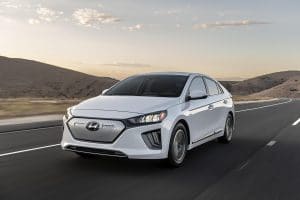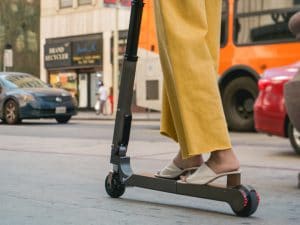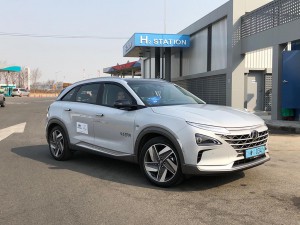Hyundai Motor Co. wants to transform itself into a “smart mobility solution provider” by 2025, and it is committing $52 billion to get there.
The “Strategy 2025” program will see a significant amount of that money invested in electrifying its line-up – a move that includes both battery and fuel-cell vehicles. But the Korean carmaker also plans to focus on other alternative mobility programs that include the introduction of “personal air vehicles,” a more sophisticated term for flying cars.
In all, about a third of the total investment will go towards future technologies that also include the development of autonomous vehicles.
(Hyundai set to nearly triple “eco focused” lines)
“The key to our future strategy is to focus on customers and to present the most desirable products and services,” said Hyundai President Wonhoo Lee. “We want to offer smart mobility experiences that meet shifting needs of our customers by leveraging advanced technology. Transforming into a Smart Mobility Solution Provider with comprehensive mobility solutions that combine devices and services will be the centerpiece of Hyundai’s future strategy.”

Hyundai is planning to ensure it is keeping up with the alternative fuel needs of buyers with an expanded Ioniq line-up.
While the automaker expects to ramp up spending significantly on the development of new products and technologies under the Strategy 2025 plan, it also aims to cut costs in other areas – for one thing, trimming spending on raw materials by nearly $30 billion through 2022.
In the process, the ongoing transformation is aimed at boosting its share of the global automotive market to 5% while also targeting an operating margin of 8% for its automotive business – a figure that would put it in line with some of the industry’s most profitable manufacturers.
Hyundai is a relatively latecomer in some areas of new mobility, such as electrification, but it already was ramping up its efforts before the latest strategy was announced. It currently offers the all-electric Kona EV, as well as the Ioniq which is offered in hybrid, plug-in and pure electric versions.
(Hyundai Partnering with Aptiv — Targeting “Production-Ready” Robocabs by 2022)
That will be just the beginning. Just last month, its U.S. subsidiary announced that it was in the process of tripling the number of “eco-friendly” models it will be offering during the next several years. These are to include hybrids, all-electric models and hydrogen fuel-cell vehicles, such as the new Nexo SUV.
By 2030, the automaker said, it will offer electrified options for virtually all models in major markets – though that process will stretch out to 2030 in emerging markets. But even before then, by 2025, Hyundai wants to position itself as one of the world’s top three producers of electrified vehicles, with sales of 670,000 annually.

Hyundai is looking beyond cars and utes for “smart” mobility options. It’s scooter can be charged while stored in the vehicle.
It will face some serious competition, however. On Thursday, General Motors announced a new, $2.3 billion joint venture with Korean supplier LG Chem that will see them erect a major new battery plant in Lordstown, Ohio. GM plans to have 20 all-electric models in production by 2023, and CEO Mary Barra said during a a news conference that the goal is to become the industry’s “leading” EV producer. Volkswagen AG, which has plans for 50 of its own BEVs by 2025, has a similar goal, as do several other manufacturers, including Ford, Toyota, Nissan and Honda.
Hyundai was vague about some of the elements of the Strategy 2025 plan, including the plan to produce “personal air vehicles.” Executive Vice Chairman Euisun Chung has already indicated his interest in flying cars but it is unclear if the goal is to develop products that individual buyers could purchase or, rather, to supply planned air taxi services such as Uber Elevate.
(Hyundai updates its triple-threat Ioniq line-up)
On top of everything else, Hyundai’s Strategy 2025 program has clicked with Hyundai investors, the automaker announcing plans for a sizable share buyback program.


All New
I like to send you information about my invention
All Electric Vehicle Without Plug In Requirement
No outside Electric needed
Vehicle drives many times without the use of the battery pack
No gasoline No diesel No hydrogen No solar
See my website heinz-welschoff.strikingly.com
I have my ev invention patent